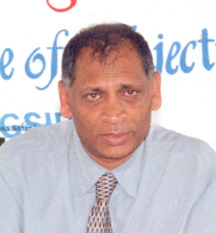Minister of Health Dr Leslie Ramsammy said Guyana has played a significant role in informing the world that non-communicable diseases (NCDs) is the danger to public health at the 66th session at the United Nations General Assembly held on Monday.
According to a Government Information Agency (GINA) press release Guyana’s involvement in the preparation of the declaration shows that small countries can make a difference. Ramsammy said the world now acknowledges that NCDs comprise a new front in the fight to promote global public health and in the fight against poverty. Guyana recognised early that the efficiency of efforts pursued at the national level needed to be complemented by regional and global consideration. It has played an active role in advancing the NCDs agenda at the regional and global levels; evident in its call since 2002, for an MDG + that includes global-led agreements for the fight against the NCDs.
Guyana also collaborated with other Caricom member states to ensure a regionally coordinated response to the NCDs. “It was not accidental that CARICOM was instrumental in facilitating the General Assembly’s consideration of the issue of NCDs… the decision was informed by the gravity of the development challenge that NCDs posed for all CARICOM member states,” Ramsammy said. “A declaration addressing the NDCs was prepared and contains many measures that will save lives in the short-term and contribute to creating a healthy society thereby aiding the prevention of NCDs, and the elimination of poverty,” GINA noted.

Ramsammy then called for the full and meaningful implementation of the political declaration, including early agreement on global targets, a monitoring framework, and a substantive and collaborative partnership of global stakeholders to facilitate continued action on NCDs. He also called for greater access to affordable, safe, effective and quality assured medicines and improved access to palliative and rehabilitative services particularly at the community level; reoriented trade and agricultural policies to facilitate the provision of healthy local foods; and, the provision of increased and sustained human, financial and technical resources from all sources, including innovative approaches.
A call was also made for member states to cooperate and support the follow-up processes such as the development of national plans by 2013 that include the overall goal of reducing preventable deaths from NCDs by 25 per cent by 2025; and to monitor the trends and to assess progress made in the implementation of national strategies and plans. Ramsammy noted that Guyana believes that there is a real nexus with the existing MDGs and the fight against the NCDs and, for example, greater consideration must be placed on the MDG Goal 8 Indicator 8e and target 13 to meet the need for better access to affordable, quality medicines, technology and diagnostics.
Similarly, existing MDGs address the need for better nutrition, improved and expanded immunization, elimination of gender disparities and improved environment control. The minister said the Global Strategy on diet, physical activity and health for prevention and control of NCDs (2004) must be implemented more effectively to boost nutrition and physical activity. “Guyana believes that Global Minimum Standard for trans-fat and salt are appropriate global actions and we must not be shy in applying such standards,” Ramsammy stated.
Additionally, the set actions for the fight against smoking, the WHO’s FCTC (2003), and the Global Strategy to Reduce the Harmful Use of alcohol (2010) must be strictly applied, he added. Guyana has joined India in declaring October 2 as No Alcohol Day to highlight its ravages in society however there is need for a global No Alcohol Day. “While Guyana is grateful that the high level meeting, has now made response to the NCDs a priority development issue, we are disappointed that there are only references to the neuro-psychiatric disorders. We believe these disorders impact too greatly on disease burden and should be given more consideration at the global level than is presently provided for,” Ramsammy said.
Several Caribbean heads of states, including Suriname’s President Desi Bouterse and Trinidad and Tobago’s Prime Minister Kamla Persad- Bissessar also made presentations at the meeting. According to GINA, prior to travelling to the US, Ramsammy met with students and professionals in the field and as a result a proposal is being drafted and will be presented at the next high level meeting of the UN National Assembly.





